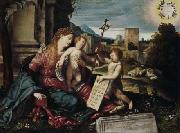Großhandels China Öl Gemälde & Rahmt Ein |
|||||||||||

|
|||||||||||
|
|
|
||||||||||||||
|
Alessandro Bonvicino
(c. 1498 - December 22, 1554), more commonly known as Il Moretto da Brescia, was an Italian Renaissance painter of Brescia and Venice. He was born at Rovato, in Brescian territory, and studied first under Fioravante Ferramola. Others state he trained with Vincenzo Foppa. His brothers Pietro and Jacopo were also painters. The 1911 Britannica claims he apprenticed with Titian in Venice and that Moretto modelled his earlier portrait-painting style on the Venetian style. On the other hand, the style also resembles that of Giorgione or late Bellini. The 1911 Britannica also states that he conceived a great enthusiasm for Raphael, though he never traveled to Rome; on the other hand, his classical serenity resembles that shown by Leonardo and his followers in Lombardy such as, for example, Bramantino. He may have consulted with his contemporary Girolamo Savoldo. Moretto excelled more in sedate altarpieces than in narrative action, and more in oil-painting than in fresco, although he painted fine frescoes depicting the lollygagging daughters of Count Martinengo in one of the palaces near Brescia. In 1521, he worked with Girolamo Romanino in the Cappella del Sacramento in the old cathedral of Brescia, where Moretto completed a Last Supper, Elijah in the Desert, and a Fall of Manna.He was active during 1522-24 in Padua. He painted alongside with Lorenzo Lotto at Santa Maria Maggiore in Brescia. Also in Brescia, he completed a Five Virgin Martyrs and his masterpiece, the Assumption of the Madonna for the church of San Clemente; a Coronation of the Madonna with four saints (c. 1525) for the church of Santi Nazaro e Celso; a St. Joseph for Santa Maria della Grazie; and a St Nicholas of Ban for Santa Maria de Miracoli. He collaborated with Floriano Ferramola in the decoration of the dome of the cathedral in Brescia. |
||||||||||||||
|
|
||||||||||||||
|
||||||||||||||
|
|
||||||||||||||
| Alessandro Bonvicino
(c. 1498 - December 22, 1554), more commonly known as Il Moretto da Brescia, was an Italian Renaissance painter of Brescia and Venice. He was born at Rovato, in Brescian territory, and studied first under Fioravante Ferramola. Others state he trained with Vincenzo Foppa. His brothers Pietro and Jacopo were also painters. The 1911 Britannica claims he apprenticed with Titian in Venice and that Moretto modelled his earlier portrait-painting style on the Venetian style. On the other hand, the style also resembles that of Giorgione or late Bellini. The 1911 Britannica also states that he conceived a great enthusiasm for Raphael, though he never traveled to Rome; on the other hand, his classical serenity resembles that shown by Leonardo and his followers in Lombardy such as, for example, Bramantino. He may have consulted with his contemporary Girolamo Savoldo. Moretto excelled more in sedate altarpieces than in narrative action, and more in oil-painting than in fresco, although he painted fine frescoes depicting the lollygagging daughters of Count Martinengo in one of the palaces near Brescia. In 1521, he worked with Girolamo Romanino in the Cappella del Sacramento in the old cathedral of Brescia, where Moretto completed a Last Supper, Elijah in the Desert, and a Fall of Manna.He was active during 1522-24 in Padua. He painted alongside with Lorenzo Lotto at Santa Maria Maggiore in Brescia. Also in Brescia, he completed a Five Virgin Martyrs and his masterpiece, the Assumption of the Madonna for the church of San Clemente; a Coronation of the Madonna with four saints (c. 1525) for the church of Santi Nazaro e Celso; a St. Joseph for Santa Maria della Grazie; and a St Nicholas of Ban for Santa Maria de Miracoli. He collaborated with Floriano Ferramola in the decoration of the dome of the cathedral in Brescia. 1550(1550) Medium Oil on canvas cjr |
||||||||||||||
|
Related Paintings to Alessandro Bonvicino :. |
||||||||||||||
|
|
||||||||||||||
|
|
||||||||||||||
|
KONTAKTIEREN Sie UNS |







